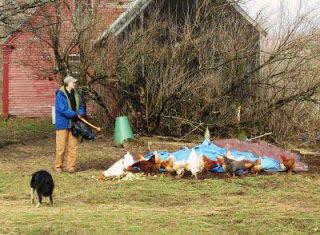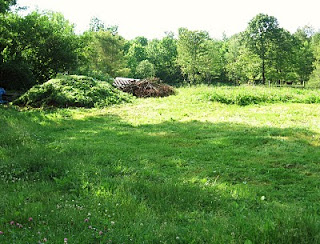Sermon for Proper 16B 2012: “Hold Everything”
(Based on 1 Kings 8:22-30, 41-43 & Ephesians 6:10-20. Copyright Mainecelt 2012))
We had to stay awake. It wasn't easy-- most of us at the Conservation District meeting were farmers, and we'd been up since dawn for one reason or another: nursing a sick animal, repairing a fence, picking greens and packing them off for a long day at the farmers' market. But the District's monthly meeting was an important one. The hard metal chairs and the fluorescent lights would have to be endured.
Now, usually, these monthly meetings are pretty routine. Maybe a landowner needs help with erosion control, and the District's staff works with the board to develop a service plan. Or maybe a town has trouble wit h storm-water runoff and they ask the Conservation District to help with assessment and management. Usually there's great news from the one of the District's educators, who works with schoolkids on all kinds of projects, like local food lunches and hands-on science where they study the ecology of wetlands and streams. We hear the reports, smile and applaud, and go home feeling pretty good about all these good local efforts to care for our land and water.
h storm-water runoff and they ask the Conservation District to help with assessment and management. Usually there's great news from the one of the District's educators, who works with schoolkids on all kinds of projects, like local food lunches and hands-on science where they study the ecology of wetlands and streams. We hear the reports, smile and applaud, and go home feeling pretty good about all these good local efforts to care for our land and water.
But this time around, everything was different. After the usual reports, a new document was handed around, and the room grew quiet. When a copy reached my hands, I realized why. The title read, “Going in Reverse: The Tar Sands Threat to Central Canada and New England.” Nineteen different organizations had signed on, from the Maine Clammers' Association and the Appalachian Mountain Club to the Natural Resources Defense Council and Maine Interfaith Power & Light.
In twenty pages, it laid out the properties of tar sands oil, a type of bitumen: extra-corrosive, extra-acidic, extra-abrasive, and basically extra-everything-bad. There was a map of the 60-year old pipeline they want to send this stuff through, from Alberta, Canada, to Portland, Maine. It explored the potential harm to waterways a nd watersheds, from the Great Lakes to the Androscoggin, Sebago Lake and Casco Bay, if this bitumen ever busted through the aging metal anywhere along the way.
nd watersheds, from the Great Lakes to the Androscoggin, Sebago Lake and Casco Bay, if this bitumen ever busted through the aging metal anywhere along the way.
Turns out, the stuff is so heavy and thick they have to dilute it with lots of chemicals to make it flow at all. They have to pump it at higher pressure, and it tends to heat up as it flows. The more we learned, the more concerned we became. That 60-year old pipeline was built before they imagined pumping anything this thick. And because the pipeline was already built, the company could reverse the flow at any time, without even informing the public.
I lived in Alaska from 1989 to 1994. I knew what a regular crude oil spill could do to wildlife and fishing communities. But this stuff wouldn't just float on the surface and wash up on the beaches. Bitumen sinks. We don't have any containment systems designed for that. If the Conservation District was going to figure out how to serve the public in the event of such a disaster, it was going to require the wisdom of Solomon.
Unfortunately, Solomon had his own containment problem. His people had been on the move for so long, pushed from one place to another, caught up in conflict after conflict...and now that Solomon was king, he wanted to make good on his father David's promise: to raise up a temple with a solid foundation, to root God's people in one glorious place, to announce that God's favour had come to rest right here, right now, finally, in a purpose-built structure with the best materials and designs and craftsmen that royal money and influence could buy.
temple with a solid foundation, to root God's people in one glorious place, to announce that God's favour had come to rest right here, right now, finally, in a purpose-built structure with the best materials and designs and craftsmen that royal money and influence could buy.
Solomon was probably a little bit stressed about this. His own route to the throne hadn't been particularly neat and clean. His older brothers had all been victims of wartime schemes, power-plays and horrible misunderstandings, until finally Solomon was the one left standing—the tenth boy-child of David, practically the last in line. And so Solomon prayed. He prayed not for riches or power, but for wisdom and understanding. And God heard Solomon's prayer and blessed him with that very gift.
Now, after all that, the big day arrived: the precious box of holiness that had rolled alongside God's people for so many years, that bouncing little God-buggy called the Ark of the Covenant, was carried up the steps by specially-selected priests, observed by the gathered elders of all the tribes of Israel. They proceeded to sacrifice so many sheep and oxen that the Bible says they lost track. Then the priests carried the ark into the inner sanctuary and installed in the newly-completed temple.
What happens next? A cloud of glory fills the whole temple. It knocks the priests to the ground and rolls through the corridors and seeps out of every possible crack and opening. The temple cannot contain the raw power and beauty and love of the Cr
Good thing Solomon prayed for wisdom. Wisdom tells him to open himself up to all God's glorious possibilities—and it tells him to keep praying. Pray he does—not just for his royal house, not just for the priests and the elders, not even just for the people of Israel. God is uncontainable. Solomon gets it. And so he prays for foreigners, for everyone beyond the circle of the chosen and the blessed. He prays that all the peoples of the earth may come to know the God who spills out everywhere, and that God would hear and answer even the prayers of the lost and wandering, the poor and the placeless.
Meanwhile, over in the New Testament, Paul is having some containment issues of his own. He's under a special kind of arrest, literally chained to a Roman soldier—sort of a living ankle bracelet for rabble-rousers. Waking and sleeping, he hears the clatter and clank of his captors' plate-mail, the iron rings rattling as they shift, leather bands creaking underneath. Ther e's no ignoring the flash of the swords and daggers suspended from their wide copper-plated belts, or their bronze helmets with the long cheek-guards and wide brims, fancy crest-ornaments stuck on top for extra show. Every soldier's footfall rings on the tile walkways thanks to the iron hobnails on their leather boots. These sights and sounds, along with the clanking weight of his own chains, create the rhythm of Paul's days and nights.
e's no ignoring the flash of the swords and daggers suspended from their wide copper-plated belts, or their bronze helmets with the long cheek-guards and wide brims, fancy crest-ornaments stuck on top for extra show. Every soldier's footfall rings on the tile walkways thanks to the iron hobnails on their leather boots. These sights and sounds, along with the clanking weight of his own chains, create the rhythm of Paul's days and nights.
Yet, somehow, Paul is allowed to write. Manacled and under watch, he is still allowed to compose and send letters that travel far. He knows his words may be carried from one household of believers to another, from one faith community to the next. And so, for the sake of his brothers and sisters in Christ, Paul has a little fun at the soldiers' expense. He suggests another dress code for followers of the Christ: not the gear of an imperial warrior, certainly not the gear of his Roman security guards: “ Put on the whole armor of God...fasten the belt of truth around your waist, and put on the breastplate of righteousness. As shoes for your feet put on whatever will make you ready to proclaim the gospel of peace.” Shoes that make you ready to proclaim the gospel of peace... Not Bean boots? Not Nikes? Not Crocs? What is Paul suggesting? He goes on with his list of recommended gear: a shield of faith. A helmet of salvation. And the only weapon in the list: “the sword of the Spirit, which is the word of God.”
This is not, as some Christians suggest, battle gear for Armageddon or the Rapture. This is how we prepare ourselves for all the everyday temptations, all the subtle evils and seductive double-talk that bleed us, bit by bit, in our daily lives. It is gear for our efforts on the home front: gear that shores up the spirit, gear that keeps a heart from breaking in the thankless, exhausting work of care-giving, gear that keeps us engaged in community outreach, gear that helps us respond to those who fear disaster, gear that keeps us connected to the health and healing of our wider world.
The whole armor of God is a metaphor, a way of reminding ourselves that we cannot fight evil with its own weapons—we have to use something different. It is a reminder that God's loving, creative, redemptive power trumps all our clever human constructions, from fancy shoes to temples to pipelines and empires. It is a reminder that we are God's beloved family, bound into the same cosmic network of action and accountability.
Especially, it is a reminder that this work is not for superheroes in a galaxy far, far away. It is here, now, in our own time and place, that we must take on the work of living faithfully. It is here, now, that we shoulder the challenge of reconciliation and justice-making. It is here that we must learn how to walk, proclaiming with each step the Gospel of Peace.
We have to stay awake. Because, all around us, people are trying to s hove and shoehorn God into boxes and temples, trying to blind us to the glory of God that seeks to bust out in our midst. They're trying to weigh everyone down with the heavy armor of empires, until our helmets cover our eyes and we trip over our own chains. But we serve the God of the foreigner, the God of royal wisdom and holy foolishness, the God of the last-in-line. We serve the God who longs for our wholeness— and the wholeness of Creation.
hove and shoehorn God into boxes and temples, trying to blind us to the glory of God that seeks to bust out in our midst. They're trying to weigh everyone down with the heavy armor of empires, until our helmets cover our eyes and we trip over our own chains. But we serve the God of the foreigner, the God of royal wisdom and holy foolishness, the God of the last-in-line. We serve the God who longs for our wholeness— and the wholeness of Creation.
We serve a God for whom there is no containment system, and God's power and love spill out everywhere, transforming and healing each of us. This is the Good News. Thanks be to God!
Photo credits: Solomon's temple found here. Roman armour found here. Maine local lunch found here. Ruth Duckworth's "The Creation" found here. Sebago Lake map found here.



















